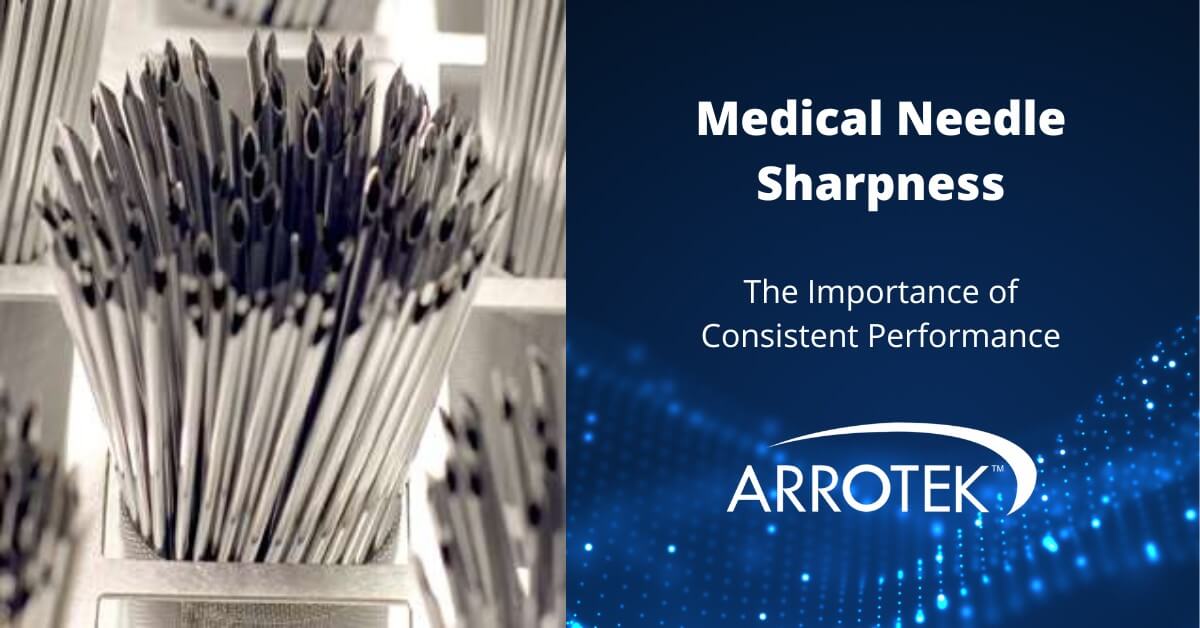Medical needles, especially those used in minimally invasive procedures, need to pierce through skin, veins, and other tissue with high levels of control and precision. Sharpness, therefore, is crucially important in medical needles.
As a result, sharpness consistency should be a core priority when manufacturing medical needles. This especially applies when dealing with micro components and needles that have extremely tight tolerances.
By ensuring optimum levels of sharpness, the quality of your medical device product will improve as sharpness is a key factor in reducing patient trauma. Sharp medical cannulas can also reduce pain, increase patient safety, and reduce the time it takes to complete medical procedures. For example, sharp needles optimise penetration force and help reduce access attempts in interventional procedures.
How Needles Get Their Sharpness
Needles get their sharpness through specialist grinding processes. These processes are adapted for the medical device industry to ensure compliance with regulatory requirements and industry standards.
Various grinding systems and methods can be used to achieve the required needle point geometry and sharpness.
Sharpness is largely down to the needle tip’s bevel angle, i.e., the steeper the angle, the sharper the edge.
Bevels and Tips
Common bevel types for medical cannulas include:
- Regular with a steep bevel angle to produce a sharp edge.
- Short with a bevel angle that is not as steep for applications where the tissue is denser or lower penetration forces are needed.
- Intradermal with a longer point length and shallow bevel angle.
- Huber Point with a curved cutting edge that is non-coring and reduces trauma.
Common tip designs include:
- Lancet
- Primary
- Menghini
- Madayag
- Chiba
- Trocar
- Spade
- Franseen
- Pencil
Manufacturing Expertise
Manufacturing sharp needles for minimally invasive medical devices requires specialist equipment and extensive expertise. This includes micro grinding expertise and capabilities, as well as expertise in the materials commonly used to manufacture medical needles.
The most commonly used material for manufacturing medical cannulas is stainless steel, and there are a number of medical-grade stainless steel options available. An experienced partner will not only have expertise across all stainless steel grades but will also be able to offer expert advice on the right grade for your application. An experienced needle manufacturer will also have knowledge of specialist materials for unique applications.
Furthermore, it isn’t enough to simply create a really sharp edge, as the needle point’s bevels must also be free from burrs both on the outside cutting edges and inside rims.
Maintaining Sharpness Throughout the Manufacturing Process
Ensuring a medical needle is sharp by the time it reaches a clinical setting requires more than specialised micro-grinding capabilities. This is because needle point grinding is only one stage of the manufacturing process to produce a minimally invasive medical device. The sharpened needle is likely to be moulded with other components and it will go through other processes, including sterilisation, quality control, assembly, and packaging.
All these stages of production can result in damage to the tip. Even slight damage that is imperceptible to the naked eye can impact the needle’s sharpness and its effectiveness in medical procedures.
Therefore, it is essential to take steps to maintain needle sharpness as the medical device goes through its various production processes.
Expertise at Arrotek
As outlined so far, manufacturing medical needles, especially those used in minimally invasive medical devices, is a highly specialised service. Partnering with a specialist needle manufacturer will ensure consistent levels of sharpness and precision, including in situations that involve high-volume production runs, micro components, and complex designs.
A specialist needle manufacturer will also operate efficiently while ensuring minimum waste.
At Arrotek, our facility in Boston, Massachusetts, USA specialises in the manufacture of metal components for medical devices. We have decades of experience manufacturing sharp medical needles for customers around the globe, with a highly skilled workforce, proven processes, custom tooling capabilities, and well-established relationships with key suppliers to optimise your supply chain.
We also have extensive design and new product development capabilities, with experienced medical device design engineers on our team. To discuss your needle requirements, including sharpness and needle point geometry specifications, please get in touch with us at Arrotek today.





